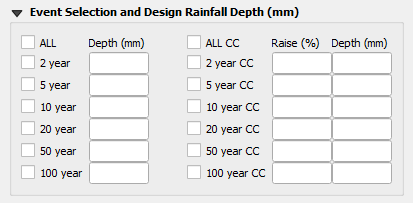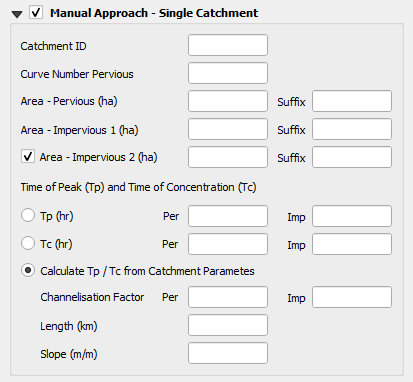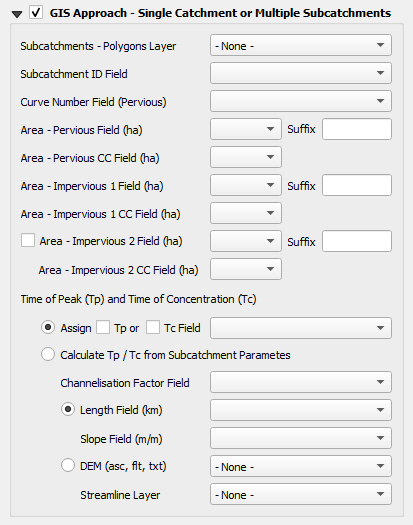QGIS SCS to TUFLOW
This Page is under construction
Introduction
This page presents a recommended method for the application of the U.S. Soil Conservation Service (SCS) (now known as the Natural Resources Conservation Service, part of the U.S. Department of Agriculture) rainfall-runoff model. They are based largely on Technical Release No. 55 (TR55) prepared by the U.S. Soil Conservation Service (SCS, 1986).
Available models
Currently, the tool is available for catchments in the Auckland Region1, however, further models are planned to be added.
Auckland Region
The model is recommended for use in stormwater management design in the Auckland Region. It has been designed as a standard tool that will provide consistent results from different users. Key features of the stormwater runoff model are described below:
- Design 24 hour rainfall depths are provided in the form of rainfall maps covering the Auckland Region.
- A standard 24 hour temporal rainfall pattern, having peak rainfall intensity at midduration. Shorter duration rainfall bursts with a range of durations from 10 minutes to 24 hours are nested within the 24 hour temporal pattern.
- Runoff depth is calculated using SCS rainfall-runoff curves, with curve numbers determined from the SCS guidelines according to classifications assigned to Auckland soil types.
Creating runoff within SCS for use with TUFLOW
The SCS to TUFLOW tool is part of the TUFLOW plugin which is explained further in the TUFLOW Viewer page. The instructions on the page should be followed to install the QGIS plugin.
Tool location
To use the SCS to TUFLOW tool, locate the SCS icon on the TUFLOW toolbar.

Alternatively, open the TUFLOW plugin menu and scroll down to ‘Extract SCS for TUFLOW (Beta)’. The tool is nominally in beta mode and we encourage feedback from external users, any comments or suggestions should be sent to support@tuflow.com.

Once the ‘Extract SCS for TUFLOW (beta)’ tool has been selected, the SCS to TUFLOW Dialog will appear.
Model Selection
Currently the Auckland Region is made available as the catchment location.

Event Selection and Design Rainfall Depth
Simulation Settings
Manual Approach
GIS Approach
Output location
Specify output location where inflows for every event, boundary database and event file will be saved. The tool also saves input_log text file that can be used as check of what has been entered into the tool. This file isn't being read into TUFLOW.

Running the tool
Once all above is set, hit the "Run" button in the bottom right corner. If there are any missing/incorrect information, the tool will prompt to fill/correct these. When all input data are filled correctly, progress bar will get active and "Processing Data Into TUFLOW Format . . ." note will appear in the bottom left corner. Once all hydrographs and other outputs are processed the note will change to "Finished Successfully".
Summary
This page provides instructions of how to use the SCS to TUFLOW tool within the QGIS TUFLOW plugin to obtain inflow inputs for use within TUFLOW model. This requires the input of design rainfall depths for selected events and catchment parameters. Apart from the inflow inputs the tool also creates boundary database and event file that can be read directly into TUFLOW.
If you encounter any issues with the plugin please email support@tuflow.com.
References
1Auckland Regional Council, April 1999, TP108. Guidelines for stormwater runoff modelling in the Auckland Region.



